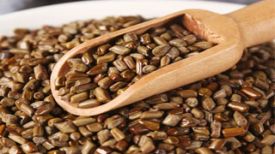Ginseng is a perennial herbaceous plant of the Panax genus in the Araliaceae family, known as the "king of all herbs" and has extremely high medicinal value in traditional Chinese medicine. The main effects of ginseng include tonifying vital energy, restoring meridians and strengthening the body, tonifying the spleen and lungs, nourishing fluids and blood, calming the mind and enhancing intelligence, etc. It is used to treat diseases such as body deficiency and loss of appetite, cold and weak limbs and pulse, spleen deficiency and insufficient appetite, lung deficiency and wheezing cough, Tianjin injury and thirst, internal heat and thirst reduction, qi and blood deficiency, chronic illness and deficiency, palpitations and insomnia, erectile dysfunction and cold uterus.
The discovery and use of ginseng can be traced back to ancient China, with the earliest records found in the Shennong Bencao Jing.
Ginseng has a variety of varieties, mainly classified based on growth environment and processing methods, including:
Wild ginseng: ginseng that grows naturally in the wild, with the strongest and most precious effects.
Mobile ginseng: ginseng that is transplanted from wild ginseng to other natural environments for continued growth.
Forest ginseng: ginseng artificially sown in a forest environment, simulating the growth conditions of wild mountain ginseng.
Garden ginseng: Ginseng artificially planted in gardens, which can be divided into sun dried ginseng, red ginseng, and white sugar ginseng according to different processing methods.
It is generally believed that wild ginseng has a long growth cycle, a natural growth environment, and high efficacy, but its resources are scarce and its price is also relatively expensive.
Ginseng mainly grows in parts of East Asia, including Northeast China, the Korean Peninsula, the Far East region of Russia, and Japan. Artificially planted ginseng can increase yield and shorten growth cycle by controlling growth environment and fertilization.
The original records of ginseng in classical medical literature include:
The Shennong Materia Medica Classic states: "It mainly nourishes the five internal organs, calms the mind, calms the soul, stops palpitations, eliminates evil energy, brightens the eyes, and promotes happiness and intelligence. After long-term consumption, it can lighten the body and prolong life."
"The Compendium of Materia Medica" states: "Ginseng can treat all kinds of deficiency diseases in men and women, including dizziness due to sweating, headache and nausea, dysentery, slippery diarrhea and prolonged dysentery, frequent urination, dribbling fatigue, internal injury and stroke, heatstroke and bi fistula, vomiting blood, coughing up blood, descending blood, blood stasis, blood avalanche, and various diseases before and after pregnancy."
Ginseng is widely used for tonifying qi and treating various symptoms of weakness. At the same time, it also emphasizes the different processing methods and subtle differences in usage of ginseng. In modern times, ginseng is still one of the commonly used medicinal herbs in traditional Chinese medicine clinical practice.
"King of Herbs" ginseng
Release time:2024-05-22 14:21:28
Reading:409
Word Count:3141
Subscribe to email


